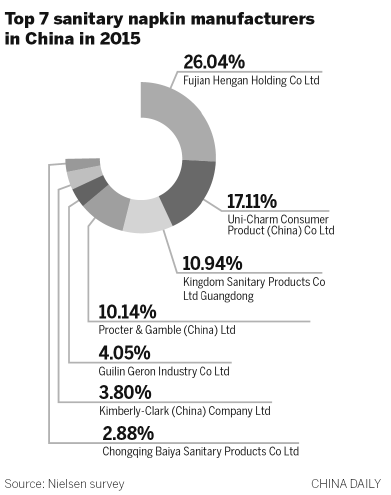Chongqing Baiya may raise as much as $19.6m in market listing
Chongqing Baiya Sanitary Products Co Ltd, one of China's biggest sanitary pad makers, plans to list on the Shanghai Stock Exchange, according to documents filed with the China Securities Regulatory Commission.
Founded in 2010, the Chongqing-based firm would become the first publicly listed maker of such products in China if the plan was approved.
The manufacturer now makes more than 60 percent of its gross profits from its most popular sanitary brand Freemore. Its other product ranges include children's' diapers.
The company plans to raise 128 million yuan ($19.6 million) through its initial public offering, according to the prospectus.
Figures from the China Paper Association showed that in 2014, around 377 million Chinese women aged between 15 and 49 regularly used sanitary pads, a market worth 34.85 billion yuan.
According to statistics from market research firm Nielsen, Baiya is the country's seventh-largest seller of the product, while in southwestern China it is the largest.
The Chinese sanitary pad market is effectively a 50/50 split between foreign brands, such as Whisper by Procter & Gamble Co and Sofy from Unicharm, a leading Japanese brand, and domestic producers such as Baiya.
But domestic brands are most often bought by consumers in second- and third-tier cities.
China only started developing its own sanitary pad brands in the 1980s.
Within a decade, foreign brands were making rapid progress in the market, helped by their higher-quality image.
The domestic makers started emerging after the turn of the century, with an estimated 2,000 different home-grown brands being sold in China.
After consolidation, the figure now stands at around 600, according to industry estimates.
Chen Yiling, an analyst at Shenwan Hongyuan Securities Co, said: "There is huge potential for the sanitary pad market in China.
"There is still a low market concentration, and with prices roughly the same, more and more domestic and foreign brands have been increasing their efforts to develop new products," said Chen.
"The emergence of more small supermarkets and convenience stores, coupled with the dynamic growth of e-commerce business, will make market competition for sanitary pads even more intense," Chen said.

